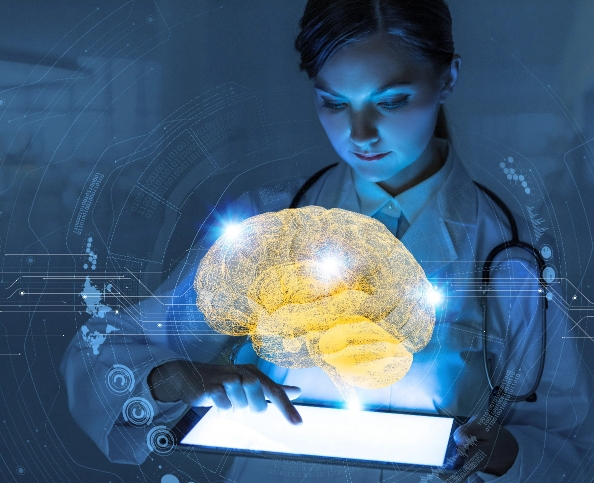Emerging Tech
Artificial Intelligence
Empowering digital transformation with AI
Our approach to adapting to AI and intelligent automation is human-centered, pragmatic, outcomes-focused, and ethical. Our expertise and domain knowledge helps us undertake challenging artificial intelligence services.
Artificial Intelligence
Artificial intelligence is the broader umbrella under which machine learning and deep learning fall.
Machine Learning
Machine learning is a subset of AI that deals with the ability of computers to learn from data without being explicitly programmed.
Deep Learning
Subset of ML composed of algorithms that permits software to train itself to perform tasks like speech and image recognition by exposing neutral networks of vast amount of data
Evolution of Artificial Intelligences
Reactive Machines
The simple reactive machines react to some input with some output. There’s no learning involved in this type of A.I., which means it will always do what you tell them without any trouble or hesitation!
Limited Memory
Limited memory types refer to an A.I.’s ability to store previous data and predictions, using that information for better future decisions. The more complex machine learning model requires a certain amount of storage space to be created but can also act reactively when necessary with little or no human input during training.
- Long Short Term Memory (LSTMs)
- Evolutionary Generative Adversarial Networks (E-GAN)
Theory of Mind
The potential for AI is immense, and we are only at the beginning stages. Self-driving cars represent one type of A.I., or Artificial Intelligence, where it begins interacting with humans through their thoughts and emotions. AI can be seen as being limited because they do not know what other people think about them, so there may never really come the point when these would become human-like.
Self-Aware
In the future, when A.I become self-aware and begin thinking for itself – it’s not hard to imagine what will happen next! The entity may create more than just themselves; they could also shape humanity into something better or worse depending on how these interactions go down between both parties involved in this hunt (or whatever you want to call them).
Evolution of Artificial Intelligences
The simple reactive machines react to some input with some output. There's no learning involved in this type of A.I., which means it will always do what you tell them without any trouble or hesitation!
Limited memory types refer to an A.I.'s ability to store previous data and predictions, using that information for better future decisions. The more complex machine learning model requires a certain amount of storage space to be created but can also act reactively when necessary with little or no human input during training.
- Long Short Term Memory (LSTMs)
- Evolutionary Generative Adversarial Networks (E-GAN)
The potential for AI is immense, and we are only at the beginning stages. Self-driving cars represent one type of A.I., or Artificial Intelligence, where it begins interacting with humans through their thoughts and emotions. AI can be seen as being limited because they do not know what other people think about them, so there may never really come the point when these would become human-like.
In the future, when A.I become self-aware and begin thinking for itself - it's not hard to imagine what will happen next! The entity may create more than just themselves; they could also shape humanity into something better or worse depending on how these interactions go down between both parties involved in this hunt (or whatever you want to call them).
Our Capabilities




TensorFlow
A powerful tool that helps people to create and train machine learning models. In a nutshell, TensorFlow takes data and turns it into something that a machine can understand. Our approach harnesses the core idea behind TensorFlow: to represent computations as graphs. This allows us for flexible implementations of algorithms and makes it easy to deploy models to different platforms based on requirements.


Google Cloud's Vision API
With the growing dependence on AI-based tools for object recognition and the areas around it, Google Cloud’s Vision API offers powerful pre-trained machine learning models. We have been harnessing Cloud Vision API’s comprehensive capabilities like Object Detection, OCR, Face Detection, and Landmark Recognition for our clients, especially in the manufacturing industry.


BERT
It’s a neural network designed to help computers understand human language. The improvements we have brought to businesses have been truly transformational. While the applications are endless, our approach in adopting and improvising the common business use-cases where language and context are the mainstream.

